… the pans are likely not “nontoxic” some independent testing and research suggests. Nor are they even “ceramic” – at least not in the way the public broadly thinks of ceramics. Now, regulators are investigating some of the pan sellers’ claims.
The only three kinds of metal pots, pans, and skillets that will ever enter my kitchen: Cast Iron, Carbon Steel, and Stainless Steel. And pure too, not clad or coated in anything, not finished with anything other than a basic seed oil seasoning.
Stainless steel and cast iron is the way
I’ve retired the last of the non-stick cookware I had. It’s all iron, cast and stamped, and stainless now.
The reason I haven’t bought an instant pot or airfryer is that I haven’t found non plastic coated ones.
Finding a non teflon coated aluminium pot with a heat capturing coil for lightweight hiking is impossible last I looked.
Just removing teflon from stuff is a huge pain too, it’s dangerous to burn it off, I might try and sand blast the Teflon off the one I have. I have to research how bad that is, probably makes way too much toxic microparticles. But it really shouldn’t be so hard to find food appliances and cookware not coated in this crap.
There are great alternatives to Jetboil and other heat exchanger systems. Some systems are also cheaper and much lighter. I highly recommend checking out Gearskeptic’s Backpacking Stove Efficiency series.
I don’t know how people can stand cast iron pans. I know they’re supposed to be great for cooking but I always feel like you can never really get them all the way clean.
A high quality cast iron pan is smoother and easier to clean out.
But if you want the best no muss no fuss option, go with carbon steel. It’s pretty easy to season, high quality pans and skillets come pre-seasoned and ready to go right out of the box.
The problem will go away when the current administration further cuts consumer protections and health oversight.
Hexclad just sent us their sign up for their class action lawsuit. Yeah it was PTFE all along. And when you rub PTFE and any kind of spatula, you’re getting PTFE in your food.
They were also shitty pans. Just stick with cast iron or stainless steel.
I got a couple of carbon steel pans. The upkeep is similar to cast iron but much lighter / easier to handle. I reach for it 90% of the time.
Bonus for carbon pans over stainless steel is that carbon pans hold their seasoning better than ss. You can’t really keep ss pans seasoned. They have to be re-coated every time before using. Outside of “looking pretty” there’s no reason to own ss pans over carbon. Cast iron stays seasoned best, of course, but they’re heavy as shit.
Yeah I would get one if they didn’t cost a million dollars and I didn’t already have too many pans.
They cost practically nothing when you consider that you can’t ever wear one out.
Cast iron and stainless steel also basically never wear out. My cast iron pan is over 100 years old.
Ss pans can’t stay seasoned, though. You have to redo it every time you cook. Carbon steel allows for some non stick build up.
Yeah you don’t season stainless steel. You have to heat it up enough to make use of the Leidenfrost effect if you want true non-stickability. It just depends on how you use it.
Cast iron is better in the way it gets it’s non-stickability from its seasoning. Which is why I use it more often than my stainless steel if that’s important in what I’m cooking.
Totally would love a carbon steel btw. I know they’re like a blessed child between a cast iron and a stainless steel. Plz send me one for free por favor.
You can’t cook with the Leidenfrost effect though… no heat will conduct into the food!
The point of oils or melted fat when cooking is partially to increase the conduction of heat into the food.
Does anyone have a source saying that ingesting cast iron seasoning (burnt fat) is ok?
I just want to make sure I’m not just picking my flavor of cancer. I assume burnt food is better than PFAS (not forever)
So… the crispy bits that result from the Maillard Reaction (the TASTY crispy bits!) may be a known problem because it produces acrylamide.
https://pubmed.ncbi.nlm.nih.gov/24875401/
“Based on the evidence of acrylamide carcinogenicity in animals, the International Agency for Research on Cancer has classified acrylamide as a group 2A carcinogen for humans.”







